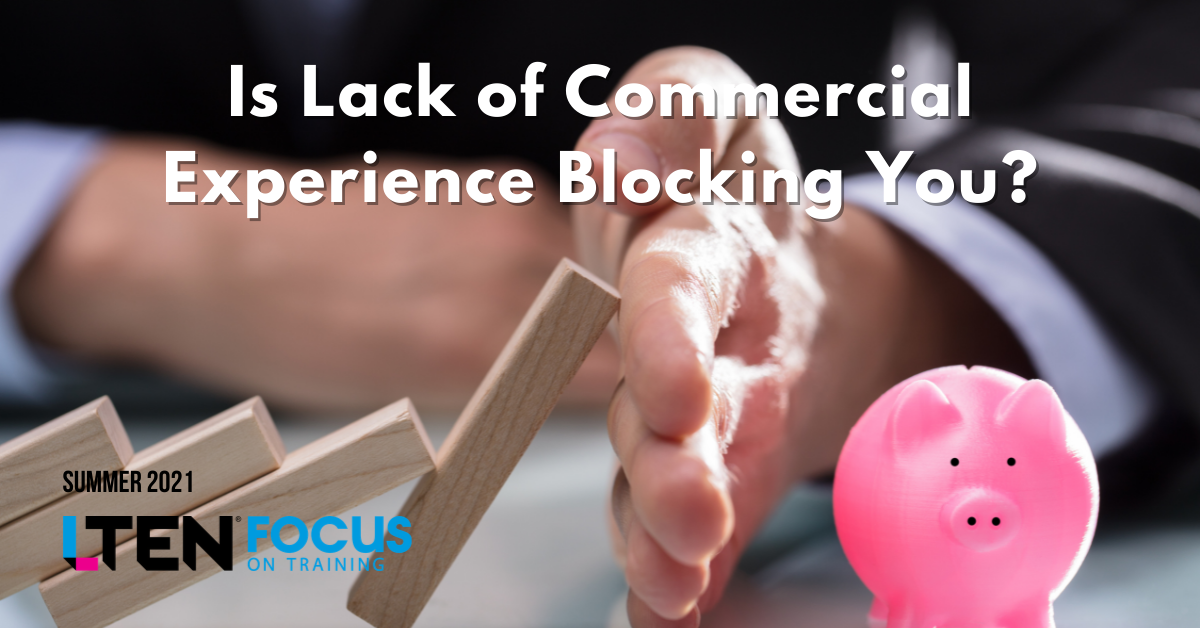
Is Lack of Commercial Experience Blocking You?
Feature Story – By Kristin Scott
Don’t let a lack of experience keep your career in check
 Commercial learning & development (L&D) leaders now can operate farther upstream and demonstrate value to commercial organizations in new ways, compared to pre-COVID-19. But a lack of prior experience in non-field commercial roles such as brand team/marketing, market research, agency/digital, insights & analytics and operations has the potential to keep commercial L&D professionals from being viewed as trusted business partners.
Commercial learning & development (L&D) leaders now can operate farther upstream and demonstrate value to commercial organizations in new ways, compared to pre-COVID-19. But a lack of prior experience in non-field commercial roles such as brand team/marketing, market research, agency/digital, insights & analytics and operations has the potential to keep commercial L&D professionals from being viewed as trusted business partners.
It’s only going to get more challenging with rapidly evolving customer engagement frameworks and omnichannel approaches.
Critical Needs
Customer and patient engagement is more complex and sophisticated than ever before, and alignment with commercial strategy, execution and feedback loops between brands, operations, analytics and field leaders is critical. The historical linear approach where L&D was viewed as execution and implementation only via handoffs from brand teams is too slow, rigid and not competitive in today’s world:
Customer and patient engagement is now a matrixed model with instant feedback and real-time pivots that raise the stakes for all cross-functional commercial teams. Commercial field teams that used to be the main (or only) implementation channel will now be one of many channels, implemented simultaneously or by triggers and algorithms.
Prior experience in commercial roles will offer upside potential to align and contribute to cross-functional commercial capabilities.
“I truly believe my ability to build high-performing sustainable curricula and strategic organizational learning mastery is a direct result of my experiences from previous roles in key areas of the business across marketing, operations, market research and franchise strategy,” said Heather DeMyers, head of oncology learning excellence, engagements & operations at Janssen. “Developing critical marketing expertise in insights generation, building strategy and developing successful go-to-launch strategic plans and execution has fostered my ability both to develop and execute training journeys and to launch training curricula. As a result, our field teams are more prepared, more confident and more knowledgeable about successful customer engagements, with the right messaging for the right customers at the right time. These experiences allow me to develop new capabilities to improve our sales force and marketing effectiveness.”
Significant Impact
Current L&D leaders who held prior commercial (non-field) roles report significant impact of that experience on the following abilities:
- Being a trusted partner vs. order-taker.
- Aligning L&D to business strategies and critical success factors.
- Offering solutions that result in positive change.
- Delivering value to learners/audiences.
- Developing others within L&D.
- Identifying needs of the business.
- Challenging thinking in a positive way.
Even heads of commercial L&D functions who did not have the prior experience themselves see the benefits the background brings.
Rick Beers, head of sales training, strategy and planning at Sunovion, said he appreciates the unique contributions of Trish Hanrahan, a sales training manager with brand team experience.
“She brings a strategic, big-picture view, thinking months ahead,” Beers said. “This helps her and helps me by keeping things on my radar. Trish models the forward-thinking mindset that our sales training managers coming directly from the field need to see and learn. She complements our team by clarifying the goal, laying out the path forward that then allows others to contribute to the important tactics and pullthrough.”
Mark Lockett, head of U.S. commercial training and leadership development at Sanofi Genzyme, said, “My prior experiences with brand teams helps me approach training as though I am running a separate business unit. I develop a strategic plan, socialize the plan within the organization and am relentless about execution and follow-up. I behave like a trainer but think like a marketer and position myself as a trusted colleague that has a solid understanding of the business.”
How do successful marketers and other commercial leaders think? Remember that many professionals in these cross-functional commercial roles are at the early stages of their post-COVID learning curves also.
10 Questions to Ask Commercial Stakeholders
Although a less traditional career path within life sciences is where many first gain experience before moving into non-field commercial roles, L&D professionals don’t have to have prior experience in organizational commercial roles to take advantage of the perspective. Nor do they need all the right answers; having an arsenal of the right questions will accelerate learning, enable understanding of partner and stakeholder goals and ultimately help deliver value and impact.
It’s easy to learn what marketers think and how it impacts L&D alignment using some of the questions below:
- What does your business/team need to do to compete and win in your market in the next quarter? Year? Beyond?
- What does (insert role) need to be able to do differently to directly impact that?
- Do you have updated competencies for roles (within your function)? How do you use them?
- What metrics or outcomes do you collect routinely to determine success?
- What signals do you formally monitor to identify insights and potential gaps in skills, knowledge, etc.? How? How often?
- What are the key performance metrics you hope to achieve and by when?
- How will you know if this (insert resource, tool) accomplishes your objectives?
- How do you anticipate customer/patient engagement channels shifting over the next 12 months?
- How do you think customer segmentation might evolve in the future? What impact might that have?
- What outcomes or metrics from L&D are most valuable to you? What is the best way to share it (reports, slides, dashboards, presentations, meetings, etc.)?
These types of questions can enable L&D partners to lead and manage change by forming strong coalitions (including potential detractors) and aligning with commercial stakeholders and partners early. More effective alignment can also increase speed of initiatives and deliverables, and reduce wasted time, budgets and resources.
Enterprise mindset, ability to anticipate potential pitfalls and plan for them in advance, and the confidence to have complete mission clarity are advantages that Eric Brand, head of L&D at Endo Pharmaceuticals, feels are attributable to his prior commercial operations roles.
“My prior experience built my confidence and strength to always position L&D throughout the enterprise as the strategic organizational lever that drives business results,” Brand said.
If interested in gaining a broader commercial perspective, consider stretch assignments or rotations in functions such as brand team/marketing, market research, agency/digital, insights & analytics, and commercial operations. It’s a very exciting time – jump in!
Kristin Scott is director, L&D solutions, for TGaS Advisors, division of Trinity Life
Sciences. Email Kristin at kscott@trinitylifesciences.com.









